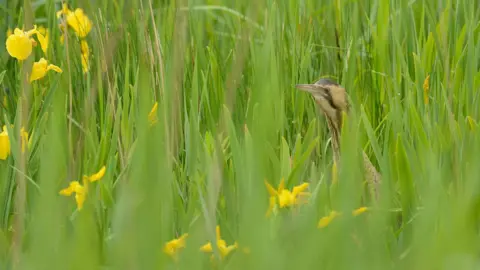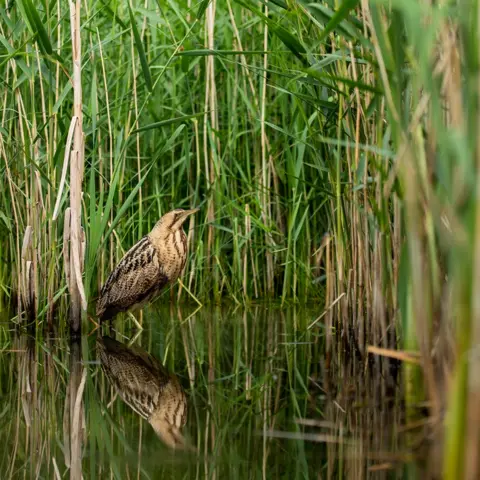RSPB: Bitterns make booming recovery in UK wetlands
 B Andrew/RSPB
B Andrew/RSPBBritain's loudest bird, the "booming" bittern, is making a recovery after almost disappearing from the UK twice.
The RSPB reported the birds had had a "record-breaking year" in 2021, with 228 males counted, up from 209 in 2019.
Ornithologist Dr Alex Lees described it as a "spectacular conservation success story" thanks to the restoration of wetland habitats.
"It shows that conservation does work," the Manchester Metropolitan scientist told BBC News.
Bitterns, a member of the heron family, are well camouflaged wetland birds that hide in reed beds.
The best way for conservation scientists to count them is during the breeding season - by listening for the male's booming "foghorn" call, which can be heard three miles (5km) away.
Unlike other birds, the male bittern does not use its voice box but muscles around his windpipe to expand his entire gullet into an echo chamber.
 B Andrew/RSPB
B Andrew/RSPBThe birds were driven to extinction across the UK in the 1870s.
A combination of hunting and draining of their wetland homes for agriculture led to their disappearance.
They returned to Britain in the early 20th Century but numbers were very low when the first annual surveys began in 1990.
And in 1997, there were estimated to be just 11 males across the whole of the UK, putting them on the brink of a second national extinction.
But systematic restoration and re-creation of wetlands over recent decades has allowed their numbers to more than double in the past 10 years, the RSPB says.
'Success story'
Simon Wotton, a senior conservation scientist from the wildlife charity, said: "[Their] recovery shows how quickly nature can bounce back when given the chance."
Dr Lees said the success of wetland conservation "isn't just about bitterns".
"We've invested millions in restoring and creating wetlands and that's meant species like cranes, spoonbills, little egrets and great egrets have returned too.
"Wetland birds are probably the biggest conservation success story of the last 40 years - it's the group of species that's really bucking the trend of nature loss."
Wetlands also play a role in flood protection and combatting climate change, by locking away carbon-rich plant matter in their mud.
So their restoration was a "win-win for wildlife and people", Mr Wooton said.
"We hope that one day the boom of the bittern will be heard around the UK once more."
Follow Victoria on Twitter .
